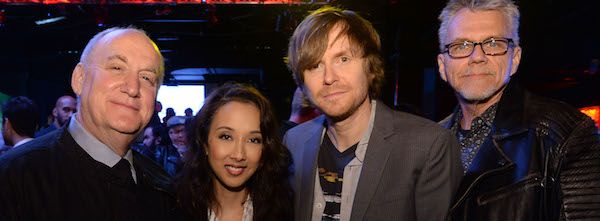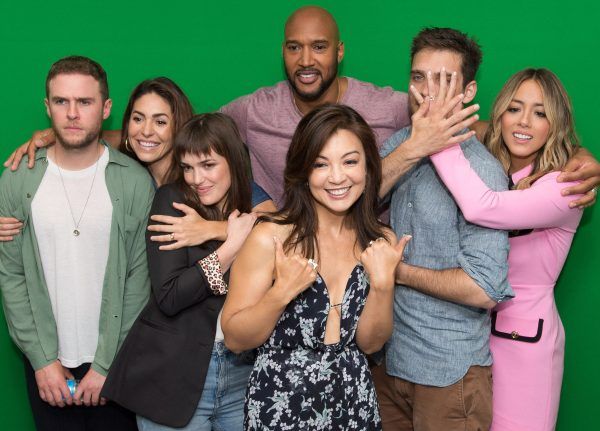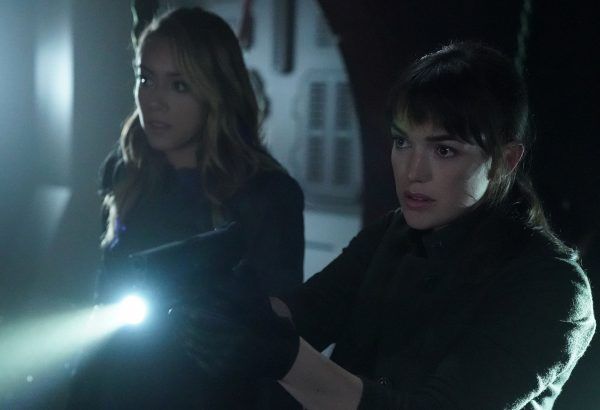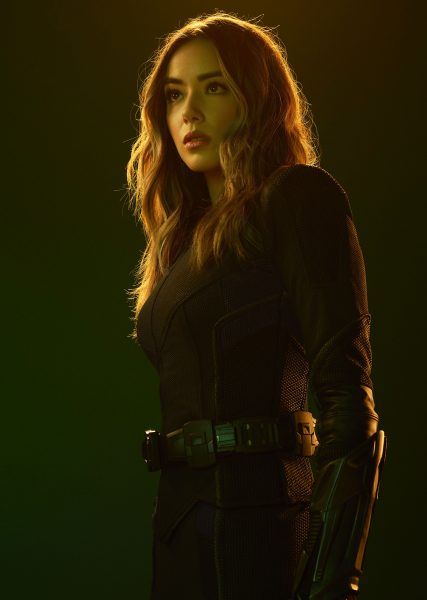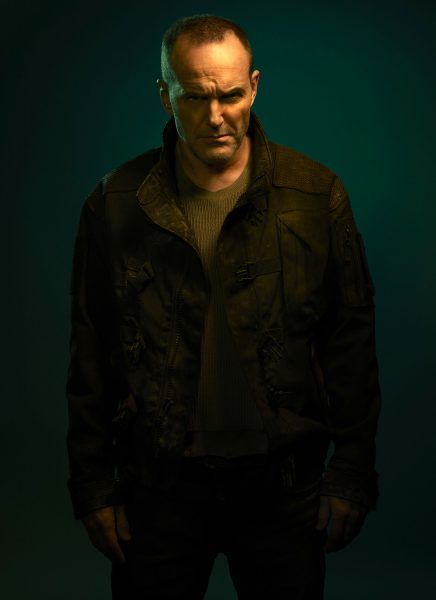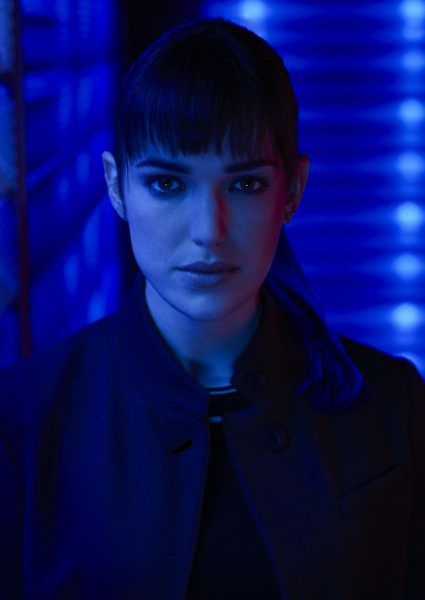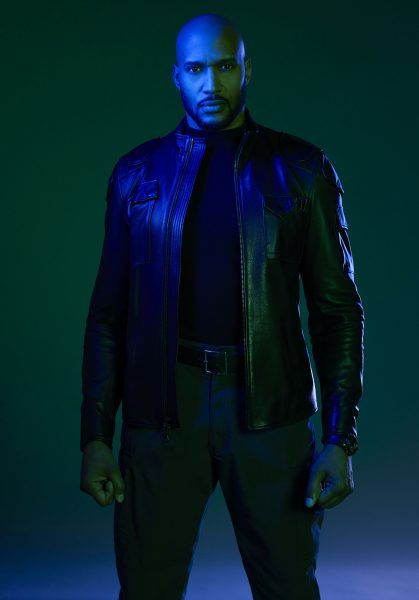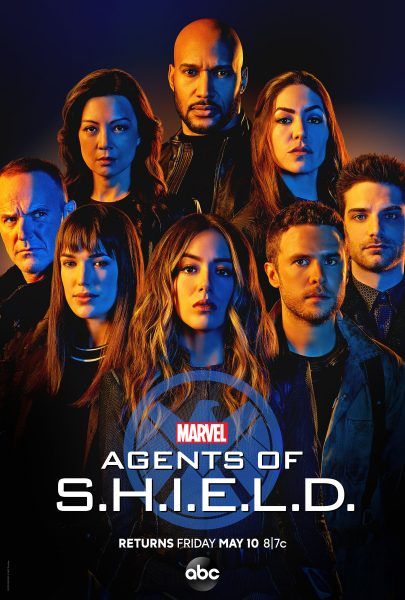The ABC series Marvel’s Agents of S.H.I.E.L.D. is back for Season 6 and, one year later, the team has had some time to adjust to a new S.H.I.E.L.D. Director, come to grips with the fact that they bent the laws of space and time to save the planet, try to figure out how they’re going to find Fitz (Iain De Caestecker) in space, and come across a new team led by someone who looks just like Phil Coulson (Clark Gregg). And while that seems like it’s all in a day’s work for S.H.I.E.L.D. agents, it also doesn’t leave much time for them to figure out what all of that means for their personal lives. The series also stars Chloe Bennet, Elizabeth Henstridge, Ming-Na Wen, Henry Simmons, Natalia Cordova-Buckley and Jeff Ward.
Collider (along with a handful of other entertainment outlets) was recently invited to the set, where they’re currently filming the already picked up Season 7, to participate in small roundtables with the cast and creative team. During the interviews, executive producers Jeff Bell, Jed Whedon and Marvel TV’s Jeph Loeb talked about why they decided not to follow the current timeline of the Marvel Cinematic Universe, telling a story that’s pre-snap, wanting to do more episodes that are different from what they’ve done before, the status of FitzSimmons, how involved May is with the team, the challenge of continuing to come up with something new so many seasons in, how they chose to end Season 6 with a big question mark because they knew they’d be returning, and how they feel about the journey they’ve taken with this series. Be aware that there are some spoilers discussed.
Question: How did you come to the decision to not incorporate the current timeline of the Marvel Cinematic Universe?
JED WHEDON: Part of it had to do with the question of when we’d air, truthfully. We had talked about summer, but there was always a chance that we’d get moved up to the beginning of the year. With the amount of characters and money and machine in place with Endgame, we had to dodge it completely.
JEPH LOEB: It’s the most important film of the year. That’s what it was.
WHEDON: So, imagine if we had incorporated it, and then, at the last minute, the network was like, “You know what? We’d love to have this on in January.” And then, all of a sudden, we’d spoil something. So, we made the decision to just be pre-snap, tell our story, and carry it forward. Hopefully, it will be satisfying and, in no way, a thing that bothers you about the show. We have our logic, but we don’t spend any time explaining it because we just wanted people to enjoy our story.
JEFF BELL: It was a challenge, and we talked a lot about it. If we came in and said it was five or six years later, there were just too many questions. There were too many words that we were not allowed to say, if that makes sense. So, that’s the decision that was made because we didn’t know [when we’d air]. In Season 1, when we first started, we could not say the word Hydra. We were forbidden to say Hydra because Hydra was hiding in S.H.I.E.L.D. We had bad guys happening, and we had what looked like a bunch of different things going on, but we were not allowed to say was the word Hydra, until after Captain America came out. After that, we could go, “Oh, Grant Ward is evil. He’s part of Hydra.” But we could not do any of that, until after the movie. And so, there are times when we have this added challenge of, “Okay, this is happening and we know this is happening, but we can’t say that this is happening.” So, the easiest way to not have to incorporate or dodge questions about that was for us to just make the decision that this season happens pre-snap.
Is it liberating, that you really get to just do whatever you want to do?
WHEDON: Yeah. I have to say that both ABC Studios and Marvel Studios have let us go where we want. In our first year, there were a lot of eyes on it, with everybody trying to focus on what the show was gonna be and what it could be. But early on, even in that year, as long as we were not stepping on some crazy toe that they had coming down the pipeline, we were able to build our story and our characters, and take them where we wanted. So, we’ve felt that liberated feeling for awhile now because they trust us, and we’re fortunate enough to have that trust. But with every season, there’s a sense, when you get to the end – especially in Season 5 when we really felt like we were gonna wrap it up and then were awarded another season – there’s new ground, and it feels refreshing and fresh and fun. We felt that same feeling this year, maybe a little more so, considering that we have a new version of Clark Gregg coming to the picture.
How are you approaching things with Fitzsimmons, and how they don’t currently know what the other is up to?
WHEDON: The thing with Fitzsimmons is that they are beloved characters, to not just the audience, but to us. They have a special place in our heart, so we like to put them through terrible, awful things. Everybody is rooting for them, but it’s less fun to root for the team that’s winning, so we tend to put obstacles in their way.
What can you say about this weird situation that Fitz is in?
WHEDON: I would just say that, as weird as that seems, that weirdness will be seen.
LOEB: One of the things that’s special about this show is that they’ve been able to take these characters and that are so beloved, and twist them and turn them into places that are weird and unexpected. It feels very rewarding, when you get to the end of that particular arc or that particular season, and they’ve sort of gotten back together again. And then, that’ll be something that maybe we tackle in Season 7.
WHEDON: The other thing I’d add is that, with Seasons 6 and 7, over the years we’ve stepped out of our comfort zone a couple times, with Simmons on the planet and with stories that were outside of our normal form of storytelling. We love those so much that, in these next two seasons, we tried to do a lot more of that – of episodes that are different from what you’ve seen before.
Is May more or less dedicated to the team, in Season 6?
BELL: We went one year later because that helps our storytelling. If Coulson had just died, there would be several months of people being really, really, really sad. We’ve had past seasons where there was a lot of grieving, and we were looking for his legacy to live on, in a positive way. So, part of going one year ahead was to allow our characters to have grieved off camera, to reference it and to go back to it, but then for us to move on and tell new, fresh stories. That’s why we did that.
Will we ever get to see the last days between May and Coulson and their goodbye, or is that something that you want to keep private for her?
BELL: We showed them going there. I believe there are some references to that time and some hints of what some of that was like, but it lives in her heart.
Thematically speaking, there’s a certain parallel to Avengers: Endgame this season, with the dealing of loss and the fallout of that. Is that something that you approached deliberately?
WHEDON: Well, it’s the nature of these stories. The definition of being a hero is sacrifice. You’re willing to go into the burning building. We touched on how, at the end of Season 5, and now we’re seeing that play out in Season 6, that you’re defined by losing people. That’s what defines this job. You have to be willing to sacrifice yourself, and the person right next to you, It’s not a coincidence that all of these heroes, if you’re in the fight, are gonna take some losses.
Once you get this many seasons into a TV show, it’s safe to assume that you’re far off of anything you might’ve imagined getting to do, at the beginning of the series. Are any of the things you’re doing now, things that you thought, “Oh, we’ll get to that in Season 6"?
WHEDON: No, we’re past everything that we thought of. We’re trying to think of new things.
Is that both really fun and really terrifying?
WHEDON: We have a lot of very smart and enthusiastic writers, so that, combined with the fact that our actors will take on any challenge, which you’ll see in Seasons 6 and 7, don’t feel like risks we shouldn’t take. And so, it frees us up, as writers, to just think of anything, and know that the actors will be willing to play it and that hopefully the audience will like it. I don’t think it’s really changed what we’re doing. It’s just that, when you’ve done 120 episodes, you start to have pitches where someone goes, “Yeah, we did that exact thing already.” So, we’re trying to find new ways to do things.
So, will the musical episode be coming soon?
WHEDON: I’m not making any promises.
LOEB: Nothing is impossible.
Because you also got the Season 7 renewal while you were shooting Season 6, did that frame the storytelling of the end the season, knowing that you were going to go straight into the next season?
WHEDON: For sure. Season 6 will not end in a satisfying way. It’ll end in a big question mark.
LOEB: But that was something that was a gift. When we originally sat down and talked about Season 6, that was it. It was only because ABC decided to go forward. It’s up to them. We can all sit here and say, “We’ve got great stories and we want to be able to tell them.” If the network doesn’t want to go forward, then there’s nothing that you can do about it. And so, they had started to watch what was happening in Season 6 and went, “Oh, can we have more of that?” Not necessarily more of the same story that we were telling, but in a post-Season 5 world, oddly enough, this incredible talent of showrunners and writers were illuminated. I see it every single season, but ABC looked at Season 6 and was like, “It’s as though you guys have found another wave of energy, so let's do some more.” That was just a complete surprise. We really thought that Season 6 with 13 episodes would wrap it up, and that would be that. And they went, “No, actually, do more of that.”
How many episodes is Season 7?
LOEB: It’s also 13.
Agents of S.H.I.E.L.D. was the first of the Marvel TV shows, but it’s gotten a bit scrappier, over the years. What has that experience been like?
WHEDON: It’s actually been rewarding. We have read many reviews that still say, “After a rocky start . . .” They’ll praise us, but still find a way to go, “After an initially rough beginning . . .” Truthfully, the reality is that people take time to get to know characters, and once they got to know our characters, they wanted to see those adventures. There were initially a lot of eyes on it, but the people who fell in love with these characters have been rewarded for that, over the year. It’s been the same for us. We’ve gotten to know the people and the characters, and we’ve gotten to fulfill our stories. We’ve all gotten to know each other and have become a family. Even if we hated the story, we’d probably want to still be doing this, with these people. Both of those things combined make it a very rewarding experience.
LOEB: From my point of view, they’re not the underdog, they’re the lead dog. With every other show that we have, there isn’t a show that’s close, in terms of the number of episodes, or a production runs as efficiently. They’re able to just continue to pull off the magic act. When I’m having a conversation with a show that’s trying to figure out their 15th episode, I’m like, “Guys, there’s a show that’s figuring out their 135th episode so, let’s try to go in that direction, and less so in the, ‘We don’t know what we’re going to do now,’ direction.” In many ways, it’s aspirational, what they’re doing here, and that’s what Marvel television is all about.
Marvel’s Agents of S.H.I.E.L.D. Season 6 airs on Friday nights on ABC.

